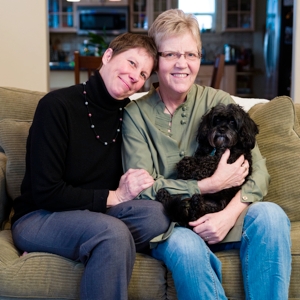
Kody Partridge and Laurie Wood in plaintiffs in NCLR’s Utah marriage equality case.
Ever since NCLR’s founding, we have been at the forefront of some of the most important legal cases in the history of the LGBTQ movement, from winning the freedom to marry in California, to securing critical protections for LGBTQ parents in courts around the country, and all the way to the steps of the U.S. Supreme Court. But no year in our history has ever been quite like this one.
The Supreme Court’s decision last summer striking down the discriminatory Defense of Marriage Act (DOMA), which barred the federal government from recognizing the marriages of same-sex couples, set off a legal tidal wave unlike anything we have seen before. Inspired by Justice Kennedy’s stirring decision—the first recognition ever by the Supreme Court that our families are just like other families and deserve the same respect—couples across the country flooded the courts with new cases seeking the freedom to marry. From Alabama to Wyoming, brave couples are stepping up to send a clear message that the time for our full equality is now.
There are now more than 70 marriage cases pending in federal and state courts nationwide, and we at NCLR are doing our part. We are representing couples in marriage cases in Florida, Idaho, Utah, and Wyoming. Earlier this year, we won an important ruling in Tennessee (now on appeal) that the state must recognize the marriages of couples who married in other states. Our Utah case was the first marriage case to be argued in a federal appeals court since the Supreme Court’s DOMA decision, and it is sure to be one of the first in this new wave of marriage cases that the Supreme Court will be asked to review.
Together with our colleagues at the ACLU, we won the freedom to marry in the New Mexico Supreme Court earlier this year, enabling our clients Jen Roper and Angelique Neuman to legally marry before Jen passed away from brain cancer. We’re committed to stay in this fight until every couple across the country has the freedom to marry.
NCLR has made tremendous progress on other fronts as well. Last year, we won important federal court decisions upholding new laws in California and New Jersey protecting youth from dangerous “therapies” that falsely claim to be able to change a person’s sexual orientation or gender expression.
We achieved other victories for LGBTQ youth. Just a few days before the Supreme Court handed down the DOMA decision, we reached a settlement with the Indianapolis Public Schools in the case of an openly gay, gender nonconforming African-American student who was subjected to severe harassment that school officials failed to address.
Not long after, the U.S. Departments of Education and Justice resolved a complaint filed by NCLR on behalf of a transgender student in California’s Arcadia Unified School District. The resolution required the school district to revise its policies to ensure that transgender students have equal access and opportunity to participate in all of the district’s activities and programs.
Our legal work does not just involve cases that make headlines. Every year, we help hundreds of people with the information provided through our legal helpline, and we help others resolve their problems without ever needing to go to court. Just in the past year, we helped an educator in a tiny rural school district in the Midwest to stay in her job after a member of the school board outed her in the community and tried to drive her out. And we advised a college soccer player in Florida whose coach subjected the student and her girlfriend, who was also on the team, to severe harassment and public humiliation in front of other team members. With our guidance, the student filed a formal complaint with the university, and the school promptly took action and fired the coach. Cases like these don’t end up in the news, but they are every bit as important to our goal of full equality for LGBTQ individuals in every state and every city and town in the country.
So there you have it – a year in the life of NCLR’s litigation work (well, a small part of it, anyway). The past year has been a wild ride, and if our current docket is any indication, the year ahead promises even more excitement. It is only a matter of time before marriage is before the Supreme Court again and, no matter what, we will be there.
Originally published in the San Francisco Bay Times.









